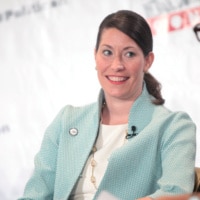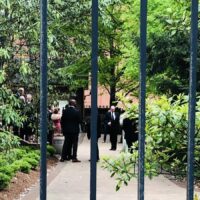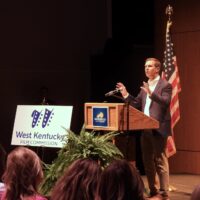A House-passed bill to keep state and local governments from asking employees and applicants if they have received a Covid-19 vaccination, and to ban colleges and universities from requiring disclosure of immunization status, has failed in a Senate committee with three days left in the legislative session.
House Bill 28, sponsored by libertarian Republican Rep. Savannah Maddox of Dry Ridge, passed the House 71-22 on March 10, but Monday the Senate Health and Welfare Committee voted 5-4 against it.
Sen. Danny Carroll, R-Benton, who has been critical of the restrictions Democratic Gov. Andy Beshear imposed to thwart the Covid-19 pandemic, said he voted no out of concern for what the future may hold.
“It’s easy to make policy in retrospect, looking at what has happened,” Carroll said. “What is difficult is to make policy and foreseeing the future. There is no way we can know what Covid will bring, what the next variant might be. How important it is that people know someone’s vaccination status, that could mean the difference between life and death, depending on the variant and how deadly it is.”
Voting yes were Republicans Stephen Meredith of Leitchfield, Michael J. Nemes of Shepherdsville, Max Wise of Campbellsville and Chairman Ralph Alvarado of Winchester, who said he cast his “aye” vote at the end of the roll call for the “sake of the sponsor.” Earlier, he questioned her handling of the bill.
Alvarado asked Maddox if she had the votes to pass the bill and if she had reached out to all committee members. Maddox said that when she approached Alvarado last week, it did not have the votes to pass, “but since that time, it has gained a bit of momentum” and that she had spoken to “a great number of them about this bill.”
Alvarado said, “I know that you haven’t spoken to all of them, at least. And so the question there becomes, why not? I know you had reached out, asked for this bill to be heard and you’re right, a brief text message was, you don’t have the votes. So I’m curious if you have them. Customarily, if a sponsor asks for a bill to be heard, the presumption is that you have the votes for it to pass. And so typically, it’s an important bill, that would be the thing that I would hope to have coming forward.”
HB 28 would also ban public entities from mandating or issuing vaccine passports and would allow parents or guardians of children in schools to opt them out of any Covid-19 vaccination requirements on the basis of a conscientiously held belief. Kentucky’s public schools do not require Covid-19 vaccinations. The bill defines a public entity as the state, a local government, or any of their agencies or departments.
“This bill is not intended to debate the merit or non-merits of receiving a vaccine,” Maddox said, adding later, “It comes down to the fact that Kentuckians are capable of making good decisions for themselves and their families when it comes to their health care without any undue influence force or coercion from the government.”
The Kentucky League of Cities opposed the bill, saying it violates the home-rule powers of local governments.
Brittney Welch of the Kentucky Nurses Association said that if nursing schools could not ask students their vaccination status it would “severely alter the ability of nursing schools” to put them in clinical settings. Maddox said HB 28 would not keep hospitals from following federal vaccine mandates, and nursing students there would have to obey them.
Senate Republican Caucus Chair Julie Raque Adams of Louisville said she voted “no” because the bill would put the University of Louisville Medical Center in direct conflict with federal law.
Also voting no were Republican Jason Howell of Murray and Democrats Karen Berg and Denise Harper Angel of Louisville.
Melissa Patrick is a reporter for Kentucky Health News, an independent news service of the Institute for Rural Journalism and Community Issues, based in the School of Journalism and Media at the University of Kentucky, with support from the Foundation for a Healthy Kentucky. She has received several competitive fellowships, including the 2016-17 Nursing and Health Care Workforce Media Fellow of the Center for Health, Media & Policy, which allowed her to focus on and write about nursing workforce issues in Kentucky; and the year-long Association of Health Care Journalists 2017-18 Regional Health Journalism Program fellowship. She is a former registered nurse and holds degrees in journalism and community leadership and development from UK.






